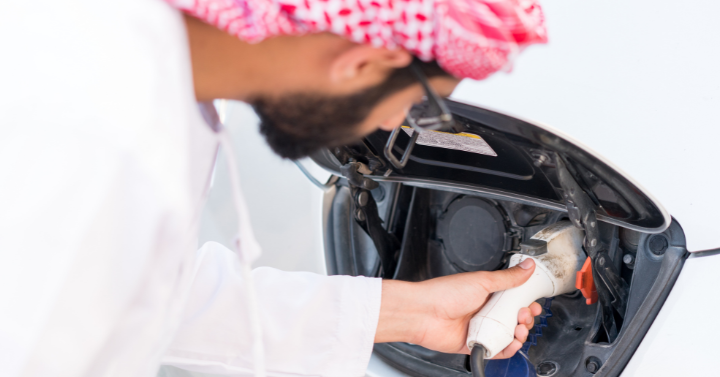Countries across the Middle East are in the middle of a sweeping economic transformation. Governments are seeking to diversify their economy, turning away from oil and gas dependency to develop broader, more versatile economies. From Kuwait to the United Arab Emirates (UAE), ambitious plans are being rolled out to develop new industries and markets, with sustainability and greener, environment-friendly alternatives to fossil fuels at their core, as unveiled in our latest research on the lubricants market in the Middle East.
Electrification is high on the agenda across the board, with governments championing schemes promoting the electric vehicle (EV) sector—from developing an EV manufacturing industry to subsidizing private EV purchases and building the necessary charging infrastructure.
This transformation is set to impact lubricant consumption in the future, since passenger EVs running on battery power alone do not require passenger car motor oil (PCMO) to function, and PCMO typically accounts for over 80% of demand in the consumer automotive segment. Hybrid EVs (including plug-in hybrids) run on fully synthetic, low-viscosity oils that require fewer oil changes over time, further reducing the overall PCMO consumption over time. The same dynamics will be visible, albeit on a more gradual scale, in heavy-duty motor oil and commercial automotive lubricant consumption. Industrial lubricant demand will also be affected. Since EVs have fewer parts, EV manufacturing requires less lubrication, particularly for metalworking fluids.
However, progress in electrification, as in the wider plan for economic renewal in the region, is uneven. Different countries are executing this transition at different speeds, with varying degrees of ambition.
Saudi Arabia aims to become the leading player for EVs in the Middle East
As part of its Vision 2030 sustainability goals, Saudi Arabia plans to phase out the sale of gasoline-powered cars by 2035 and build thousands of EV charging stations, in cooperation with the private sector, during the intervening period. 500 charging stations have already been installed. A fledgling EV manufacturing sector is already developing in the desert kingdom, with luxury EV manufacturer LUCID constructing an assembly plant in Saudi Arabia. Ceer, the producer of the nation’s first “Made in Saudi” EV, aims to contribute $8 billion to the economy by 2034. The Kingdom, in addition, is investing over $20 billion in renewable energy projects.
The EV market in the UAE is undergoing rapid development
The UAE government is committed to reducing energy consumption by 40% and carbon emissions by 10 million tons in the transport sector by 2050. The government’s goal is for EVs to make up over 50% of the passenger vehicle parc, also by 2050. Demand for EVs is expected to grow by 30% between 2022 and 2028, driven by government incentives such as the Green Charger Initiative. Several EV manufacturing facilities are being established in the Emirates, and the long-term impact on the lubricants market is expected to be seen after 2030.
Kuwait is taking significant steps toward sustainability and economic diversification
The country’s Vision 2035 aims to transform Kuwait into a regional hub for trade, finance, and culture, while reducing reliance on oil. Kuwait has committed to reducing greenhouse gas emissions, enhancing adaptation to climate change, and promoting green growth and circular economy initiatives. The government is actively supporting the EV market through initiatives such as the “EV City” development plan, which should present opportunities for foreign EV manufacturers to set up facilities in the Gulf country.
However, EV penetration in Kuwait is still very low and is not expected to grow substantially in the near future. A similar situation can be observed in other Gulf countries such as Bahrain and Qatar. Qatari government plans to convert government fleets and public transport to EVs and achieve a 10% market share of EVs by 2030, while committing to building up EV charging infrastructure. These sustainability efforts demonstrate Qatar’s commitment to addressing environmental challenges and transitioning toward a more sustainable future.
For further insights into the impact of electrification and sustainability trends on lubricant consumption in the Middle East, refer to our soon-to-be-published Opportunities in Lubricants: Middle East report. This valuable resource helps subscribers identify opportunities for revenue growth, recognize barriers to growth, develop strategies to overcome them, and evaluate leading suppliers active in the region. It also provides insights into opportunities for mergers, acquisitions, and alliances. To learn more, please contact us.

